Canadian clamor over Meng’s case has Trudeau government in a fix
By Liu Dan Source:Global Times Published: 2019/7/9 20:13:40

Photo: VCG
The declaration issued by leaders at the G20 summit in Japan in late June reflects severe divergences and final compromises among countries amid current trends of unilateralism and protectionism.
The bilateral meeting between top Chinese and US leaders was quite eye-catching, but brief interactions between Chinese President Xi Jinping and Canadian Prime Minister Justin Trudeau also garnered attention. After all, the meeting was one of the very few official high-level contacts between China and Canada since Huawei CFO Meng Wanzhou was arrested in Canada in 2018. According to Trudeau's office, the two sides had "positive, constructive interactions" on the sidelines of the G20 summit.
However, given that no formal bilateral meeting between the two countries followed, such "constructive interactions" had limited effect on their engagement.
As a matter of fact, a series of moves on the Canadian side before the G20 summit showed that Canada was not planning to proactively communicate with China through bilateral channels, but instead hoping to pressure China with the help of the US and the international community.
On June 20, Trudeau visited Washington, stressing that the US and Canada are close allies. Trump vowed to press China on Canada's behalf over Beijing's detention of two Canadians. Former Canadian ambassador to China David Mulroney said relations between Ottawa and Beijing are at "a turning point." According to Mulroney, the rift over Huawei has pushed Canada to seek closer ties with the US. He noted that "we are coming to the end of a long period during which China has been allowed to be a free rider."
On June 28, Canadian Foreign Affairs Minister Chrystia Freeland said Canada has assembled a "broad international coalition" of countries who support Canada over the detention of the two Canadians by China.
The Trudeau administration has been considering naming a special envoy to visit China. Former Canadian prime minister Jean Chrétien expressed his willingness to come to China to negotiate. But before the possible trip, divergences emerged within the country.
The Globe and Mail reported that Chrétien had floated the idea of Ottawa canceling Meng's extradition as a way to thaw out tensions with China. Yet Foreign Minister Freeland rejected the idea as a "dangerous" proposal. The probable visit by Chrétien as special envoy to China is thus becoming unlikely.
Trudeau's US visit has earned him a good reputation within his country and changed the previous image of his administration led by the Liberal Party of not making enough effort to save detained Canadian citizens. This has won the prime minister wider public approval ahead of Canada's upcoming election in October.
However, China-Canada ties are about long-term interests of both countries, rather than a bargaining chip for a single election. Trade between the two countries accounts for only a part of their respective total trade volume. But for Canada, maintaining a good relationship and negotiating a potential free trade deal with China means better choices of trade, market growth, and a more stable trading partner.
Currently, China has halted any meat imports from Canada and has stopped buying Canadian canola seed, which has already negatively affected Canada's domestic market and dented Canadian voters' confidence in the Liberal Party's trade policies and its way of handling diplomacy.
In addition, Trump's style of leadership has shown that putting all eggs in the US basket is the wrong choice for Canada. The Globe and Mail quoted Canada's former ambassador to China, Guy Saint-Jacques, as saying that "little will be accomplished if the President simply mentions the issue as a favor to the Prime Minister - without making it clear that the US expects the Canadians to be freed."
Canada's former foreign affairs minister John Manley also noted that the best way out of the situation would be for Trudeau to convince Trump to withdraw his extradition request for Meng.
If Canada wants to get rid of the current dilemma it is in, it can no longer wish for Trump's help, but figure out ways to make Trump shoulder his responsibilities.
There are less than four months before the federal election. After the G20 summit, installed trade negotiations between China and the US will probably resume. As a bargaining chip in the talks, the case of Meng Wanzhou will undoubtedly matter, which means Canada will still be caught up in the trade war. While Trudeau and the Liberal Party will be more cautious before the election and likely focus more on domestic issues, no major change will occur in Beijing-Ottawa ties any time soon.
The author is a research fellow with the Center for Canadian Studies, Guangdong University of Foreign Studies. opinion@globaltimes.com.cn
Posted in: VIEWPOINT,WORLD FOCUS